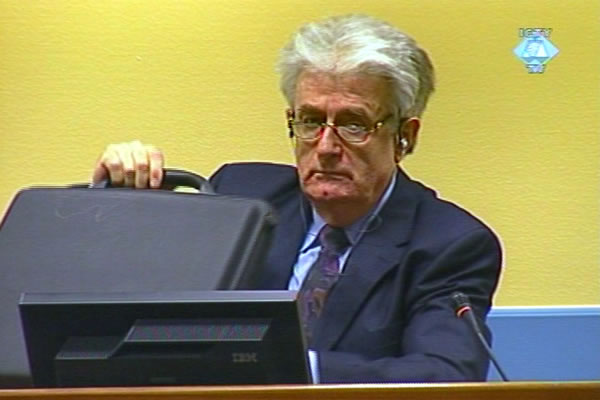Home
KARADZIC WANTS SADDAM-STYLE TRIAL
Former Bosnian Serb leader Radovan Karadzic is not opposed ‘in principle’ to the proposed amendments in the indictment against him, but he believes that judicial economy would be best served if he were to first stand trial "for one of the components of the proposed amendments to the indictment". A decision could then be made about the remaining three components
 Radovan Karadžić u sudnici Tribunala
Radovan Karadžić u sudnici Tribunala In his reply to the prosecution request former Bosnian Serb leader Radovan Karadzic maintains that he "in principle" does not object changes in the current ‘amorphous’ indictment. He however believes this proposed indictment to be ‘not much better’. As he sees it, the preparations for the trial of this scale would take years. Therefore, Karadzic suggested that the Trial Chamber ‘take control over the process’ and limit number of accusations to one group from, in his view, four ‘distinct’ units or groups.
The first set of charges, according to Karadzic, relates to ‘crimes committed in various municipalities in Bosnia from 1991 in furtherance of the alleged objective of expelling Muslims and Croats". The indictment qualifies them as genocide, extermination and persecution. The second set, the accused contends, relates to ‘crimes committed in connection with the alleged siege of Sarajevo from 1992’. The indictment qualifies them as the artillery and sniper terror campaign against Sarajevo and its citizens throughout the war period. The third set of charges is related to the ‘crimes in Srebrenica in 1995’. Karadzic this time didn’t label them ‘alleged’ but nevertheless failed to say that they were qualified as genocide. Finally, the fourth group, as the accused put it, consists of ‘hostage taking incidents’ in the summer of 1995.
If the Trial Chamber grants the amendments proposed by the prosecution, Karadzic noted, it has to allot adequate time to the accused to prepare for ‘one of the most complex trials in history’ which will take ‘years and years’. The accused believes that the Trial Chamber should try Karadzic first on one set of charges.
Only after the trial and the judgment delivered for that set of charges, Karadzic argues, the Trial Chamber will be able to ‘assess what is in the interest of justice and if proceeding on additional components of the proposed amended indictment will prejudice the accused’. This, the accused went on, "would also allow the United Nations Security Council the opportunity to determine whether and how long it wished to continue to allow the Tribunal to operate without being held hostage by an uncompleted mega-trial".
According to Karadzic, this would be "the Tribunal's first and best opportunity to demonstrate that it has learned the lessons of the Milosevic trial". "By approving only a limited amended indictment, the Trial Chamber will promote the interest of a fair and expeditious trial for all concerned", the accused concluded.
Karadzic in essence wants to be tried ‘Saddam-style’: separate trials for each charge or set of charges. Former Iraqi president first faced charges of massacre in Dujal and was sentenced to death. He then stood trial again on another set of charges, for genocide in Falluja. Saddam however didn’t live to see the judgment because he was hanged before the end of the second trial. Karadzic doesn’t face this risk.
Linked Reports
- Case : Karadzic
- 2009-01-19 APPEALS CHAMBER WILL HEAR KARADZIC ON HIS ‘IMMUNITY’
- 2008-12-16 KARADZIC WANTS TO BE TRIED WITH ZUPLJANIN, PROSECUTION OPPOSES IT
- 2008-11-21 PROSECUTION: ‘IMUNITY AGREEMENT’ OF NO INFLUENCE TO THE CASE
- 2009-02-20 RADOVAN KARADZIC’S PLEA POSTPONED
- 2009-03-03 KARADZIC: ‘THIS TRIBUNAL HAS NO RIGHT TO TRY ME’
- 2009-04-02 KARADZIC WILL CONTEST EVERYTHING EXCEPT ‘WEATHER’
